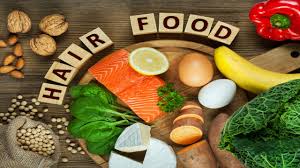Diet for Hair Growth : Top foods to help your hair grow back
Diet for Hair Growth: Top foods to help your hair grow back Maintaining strong, healthy hair can be aided by eating well. In addition to what you eat, you can prevent hair loss by not washing it

Diet for Hair Growth: Top foods to help your hair grow back
Maintaining strong, healthy hair can be aided by eating well.
In addition to what you eat, you can prevent hair loss by not washing it too often.
Your hair may lack nourishment if you aren’t getting enough of certain foods’ nutrients.
Your skin, hair, and nail condition is significantly impacted by your intake of essential fatty acids, particularly omega-3s.
Foods high in omega-3 fatty acids should be included in your daily diet, and these include:
- Fatty fish such as salmon, tuna, and mackerel
- Products derived from flaxseeds; chia seeds; canola oil; flaxseeds
- Walnuts
- Cruciferous vegetables, soy products, and
- Vegetables (broccoli, cauliflower, Brussel sprouts)
Your hair also benefits from B vitamins, B12, and folic acid. They are often in short supply among vegetarians and vegans.
Bananas, white potatoes, sweet potatoes, and spinach are all excellent sources of vitamin B6. Meat, poultry, fish, and dairy products are unique places to get your B12.
Plenty of produce, especially citrus fruits and tomatoes, are good sources of folic acid.
Beans, lentils, and whole-grain goods also contain them.
Many individuals don’t get enough protein, which is a problem because it’s essential for maintaining good hair.
Protein can be found in lean meats like fish and poultry, eggs, and soy products. Consume a daily serving.
Disorders can also bring on hair loss or change with your thyroid, anaemia, autoimmunity, or hormones.
Does dietary insufficiency cause hair loss?
As we age, many of us share a common desire for thick, healthy hair.
The growth rate and the tissue’s quality depend on various factors, such as age, general health, genetics, environmental exposure, drugs, and food.
The hair follicle growth cycle and cellular turnover rely heavily on the vitamins and minerals ingested through meals.
If you don’t get enough of the proper nutrients in your diet, you may experience hair loss.
Hair loss has been linked to a lack of minerals such as vitamins B12 and D, biotin, riboflavin, and iron.
If you are experiencing hair loss due to poor nutrition, eating a balanced diet high in specific vitamins and minerals may help encourage hair growth.
Even if studies on the relationship between micronutrients and hair loss are still lacking, obtaining enough of these 13 foods is essential because they’re loaded with nutrients that promote hair development.
- Eggs
Protein and biotin are two nutrients necessary for healthy hair growth, which may be found in abundance in eggs.
Hair follicles primarily comprise protein, so consuming a proper amount of protein is critical for hair growth.
- Berries
To some extent, the vitamins and minerals found in abundance in berries can aid hair development.
Vitamin C, which has powerful antioxidant qualities, is included in this.
Hair follicles can benefit from antioxidants because they help prevent damage from free radicals. These chemicals occur ordinarily in living organisms and their surroundings.
- Spinach
Folate, iron, and vitamins A and C can aid hair growth, and spinach is a healthy green food that provides all three.
Recent research has linked vitamin A intake to healthier hair. However, excessive vitamin a piece of information has been linked to hair thinning and loss.
- 4. Fatty Fish
Salmon, herring, and mackerel are fatty fish that may help stimulate hair growth due to the nutrients they contain.
They are rich in omega-3 fatty acids, which have been shown to stimulate hair growth.
Taking a supplement with omega-3 and omega-6 fatty acids and antioxidants has been shown to prevent hair loss and promote hair growth in a previous study involving 120 women.
- 5. Sweet Potatoes
Beta-carotene is abundant in sweet potatoes. Vitamin A, which the body produces from this molecule, has been related to healthy hair.
- Avocado
Avocados are an excellent addition to any diet since they are tasty, wholesome, and a rich source of heart-healthy fats.
Vitamin E, which may aid hair growth, is also abundant in these foods. The vitamin E content of one avocado is equivalent to 28 per cent of the recommended daily intake.
- Nuts
Nuts are a great snack since they’re portable, sweet, and packed with nutrients that promote healthy hair.
In addition to their role in promoting hair development, nuts have been associated with numerous additional health advantages, including decreased inflammation and a decreased risk of cardiovascular disease.
- Seeds.
Seeds are a great source of healthy nutrients with low calories. A number of these nutrients also play a role in hair development. Vitamin E, zinc, and selenium are some examples.
- Sweet Peppers
Vitamin C, abundant in sweet peppers, may promote hair development because of its antioxidant properties.
The vitamin C content of a single yellow pepper is equivalent to 456% of a woman’s daily requirement and 380% of a man’s requirement.
- Oysters.
One of the most acceptable food sources of zinc is oysters. Up to 96% of a woman’s daily zinc needs can be met by eating only one medium oyster, and 75% of a man’s daily zinc needs can be
The mineral zinc is vital in the growth and restoration of hair.
- Meat
Meat is commonly consumed because of its high nutrient density, which may promote hair growth.
Meat’s protein is excellent for you because it speeds up recovery time after damage and helps strengthen hair follicles so you can grow healthy, beautiful hair.
Approximately 29 grammes of protein may be found in a cooked 3.5-ounce (100 gramme) portion of sirloin steak.
TAKEAWAY
You are what you consume, and that includes your hair.
Hair development can be stunted or even stopped entirely if the body doesn’t get enough nutrients like vitamins A, C, D, and E; zinc; B vitamins; iron; biotin; protein; and essential fatty acids.
To combat hair loss and speed up hair growth, it may be helpful to remedy a shortage in any of these nutrients.
If you’re concerned that you’re not getting enough of these nutrients, try upping your intake of the foods listed above.



